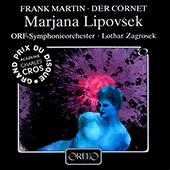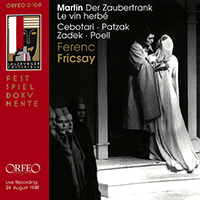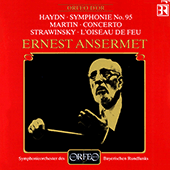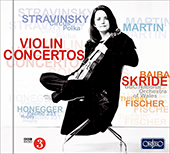
Frank Martin (1890 - 1974)
Swiss and of remoter French ancestry, Frank Martin later settled in Holland, while teaching composition in Cologne. He had earlier been associated with the Dalcroze Institute, while enjoying a career also as a keyboard player and teacher. His music combines a German element with French in a musical idiom that is his own, which remained tonal even after the principles of Schoenberg’s serialism had been absorbed and adapted to his own particular use.
Stage Music
Martin wrote two operas, a version of Shakespeare’s The Tempest (Der Sturm) and of Molière’s Monsieur de Pourceaugnac. Ballets include Das Märchen vom Aschenbrödel (‘The Story of Cinderella’), and there is what is described as an oratorio/spectacle in Le mystère de la Nativité (‘The Mystery of the Nativity’). He provided incidental music for plays from the Oedipus trilogy of Sophocles, for Racine’s Athalie and for Shakespeare’s Romeo and Juliet.
Orchestral Music
Frank Martin’s Petite symphonie concertante, for harpsichord, harp, piano and two string orchestras, is probably the best known of his compositions. His concertos include a somewhat astringent First Piano Concerto; a concerto for wind instruments, percussion and strings; a violin concerto; a harpsichord concerto; a second piano concerto; and a cello concerto. His five Ballades are also scored for solo instruments with a small orchestra, featuring respectively saxophone, flute, trombone or tenor saxophone and cello, with a final Ballade for viola, wind, harpsichord and harp.
Chamber Music
Chamber music by Frank Martin includes a variety of music, including three of the Ballades later orchestrated, a sonata da chiesa for viola d’amore and organ, two violin sonatas and a string quartet.
Keyboard Music
Martin’s piano music ranges from Ouverture et foxtrot for two pianos to the final Fantaisie sur des rythmes flamenco (‘Fantasy on Flamenco Rhythms’). He wrote a passacaglia for organ.
Vocal and Choral Music
Choral music includes the oratorios Golgotha and In terra pax and a cantata, Pilate, as well as a setting of the Mass and a Requiem. His song settings range from Ronsard to Rilke.



















